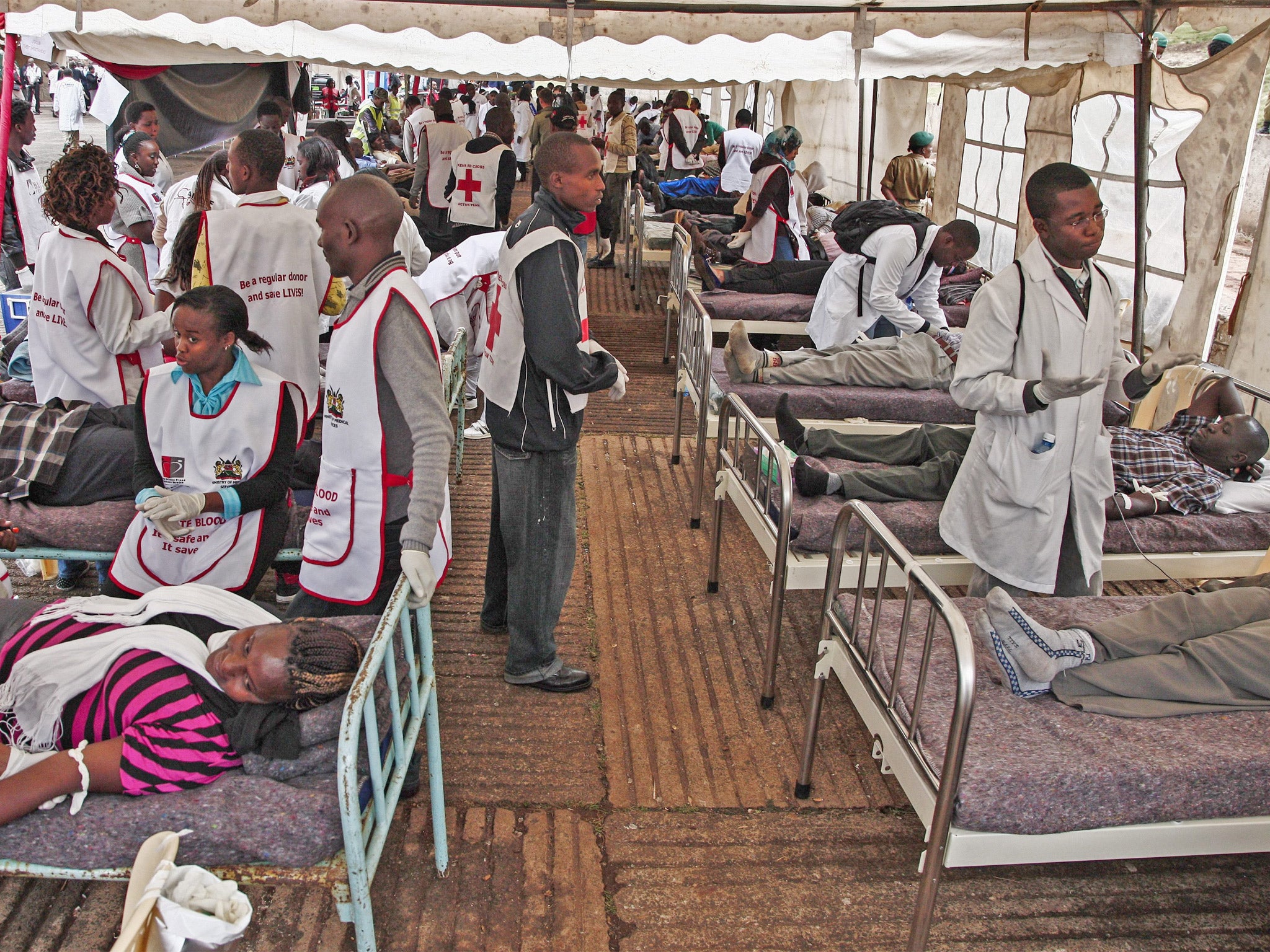Kenya shopping mall attack: ‘They threw a grenade at us. We are lucky to be alive’ - survivors tell their stories

Your support helps us to tell the story
From reproductive rights to climate change to Big Tech, The Independent is on the ground when the story is developing. Whether it's investigating the financials of Elon Musk's pro-Trump PAC or producing our latest documentary, 'The A Word', which shines a light on the American women fighting for reproductive rights, we know how important it is to parse out the facts from the messaging.
At such a critical moment in US history, we need reporters on the ground. Your donation allows us to keep sending journalists to speak to both sides of the story.
The Independent is trusted by Americans across the entire political spectrum. And unlike many other quality news outlets, we choose not to lock Americans out of our reporting and analysis with paywalls. We believe quality journalism should be available to everyone, paid for by those who can afford it.
Your support makes all the difference.A man, his arm bandaged, stands wearily outside Nairobi’s MP Shah Hospital, stealing a cigarette before he goes back to his wife, who has recently emerged from surgery to remove the multiple pieces of shrapnel lodged in her body.
Kadeer Mughal, 64, would normally have been at work, but Saturday was his birthday, and his wife urged him to go to the nearby Westgate mall for a celebratory lunch.
They were just looking for parking in the basement of the mall when they heard a loud explosion. His wife suspected a terror attack, and they immediately sought an exit, but found their way blocked by three of four cars, their occupants shot and dying.
“I told my wife to get out, and we hid behind the rear wheel of the car,” he recalls. “I don’t know how they [the militants] saw me, but they threw a grenade at the car, and it exploded under the engine. It threw my wife 10 feet away.”
People rushed to their aid, but when the shooting intensified, they fled. Alone, Mr Mughal dragged his wife, who was bleeding profusely through her white blouse, towards a store room, where a woman – he does not know her name – stemmed the bleeding in a move that he is sure prevented his wife from dying.
They were rescued a short while later. “We are just so lucky to be alive,” Mr Mughal says. His wife, however, has a long road to recovery. Some bits of shrapnel will never be removed, so close are they to her spinal cord and vital organs.
“She is deeply traumatised,” he says. “She wakes up in the night shouting, ‘They are going to kill me!’” Her son, who has not slept for three days as he remained by his mother’s bedside, is baffled by what happened. “We are Muslims. I pray five times a day, I am very into Islam. But not like this,” he says.
It may be days before the full human cost is counted of Kenya’s worst terror attack since the bombing of the US consulate in 1998 that killed 213 people. Many of the victims – officially numbering 62 so far – are children, while at least three pregnant women have reportedly lost their lives.
Children had flocked to Westgate on Saturday, some participating in a cookery competition on the rooftop, others to play, others accompanying their parents to shop and dine.
Several Nairobi schools have been hit hard by the attack. A school catering mainly to the Asian community lost four children, while an international school lost two.
In a city where inequality between the prosperous and the poor remains the starkest in Africa, affluent and middle-class Kenyans have felt the attack most keenly. But many Kenyans who could never have hoped to shop there were among the first to die in the attack. They included nannies, cleaners, security staff and taxi drivers.
Two children under the age of six were waiting in the car park with their nanny when the shooting started. She flung herself on top of the two children to save them. The children had a miraculous escape, but their nanny was shot and killed.
Medics at one hospital alone said they knew of 13 children who were killed, with one doctor describing how he spent 40 futile minutes attempting to revive a child as his mother looked on, weeping and begging him to save the boy’s life.
Hélène Conway-Mouret, the French minister responsible for nationals abroad, told a French TV channel that a mother and daughter were “executed in the parking lot” of Westgate.
“As medics, we see a lot of trauma, accidents, but the shooting of women, and children of all ages, has been much more traumatic,” said Dr Harsh Khoda, head of A&E at MP Shah hospital, adding that more than 100 people had been admitted since the siege began on Saturday. “We have seen everything from minor shrapnel wounds to major gunshot wounds. It is still a blur.”
The tragedy has united a society normally polarised by tribal and racial differences. Kenyan Asians, who have often borne the brunt of resentment in Kenya, have helped lead the response to the tragedy with the provision of sustenance and counselling.
But some fear that when the immediacy of the tragedy recedes, the old differences will re-emerge. “When something like this happens, everyone comes together,” said one Kenyan Asian. “[But] all this is going to be forgotten. It will go back to ‘Asians this, Asians that’.”
Video: Police saves mother and her children
Join our commenting forum
Join thought-provoking conversations, follow other Independent readers and see their replies
Comments